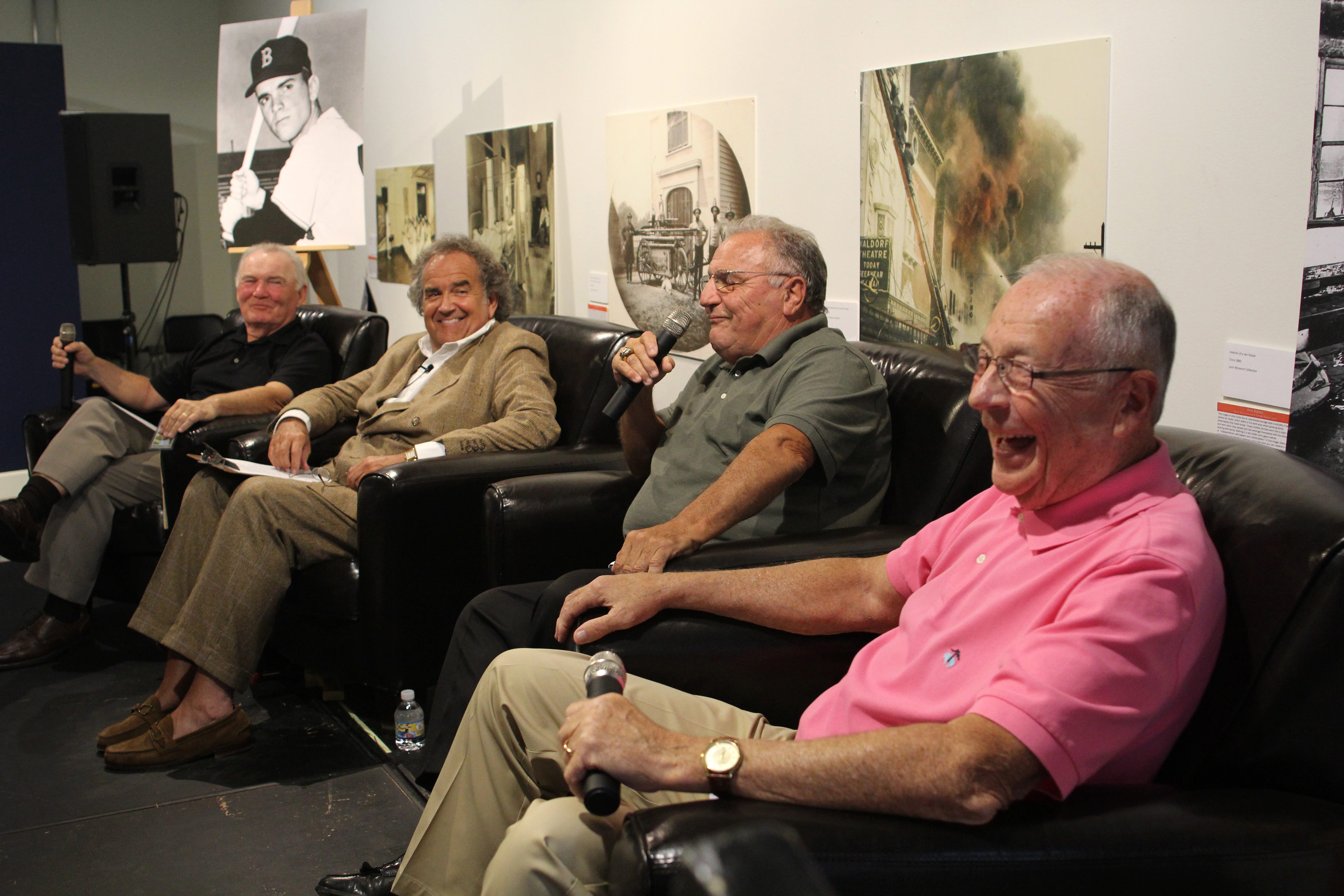LYNN — It had the feel of a kitchen-table gathering, with stories, and the coffee, in constant, steady supply.
Thursday’s “Tony C” night at the Lynn Museum featured three of the Tony Conigliaro’s oldest and closest friends — Tom Iarrobino, Frank Carey and Tony Nicosia — who took turns with funny, poignant and, ultimately, somber remembrances of the late Boston Red Sox slugger.
The trio of former St. Mary’s baseball stars spoke before a stand-room-only crowd of more than 150. The event was moderated by Daily Item publisher Ted Grant, himself a St. Mary’s alumnus. Both Essex Media Group (which owns The Item) and St. Mary’s sponsored the event.
Set up in a question/answer format, Grant asked the three former athletes about their memories of Conigliaro, and billed the evening “stories you haven’t heard” about Conigliaro. Some were funny, but many cut to the chase of what kind of a person Conigliaro really was when the lights were off and the game was over.
For example, they all acknowledged Conigliaro, who had a reputation for being brash and cocky, could be exactly that. Carey was reminded of the time he boasted that he could get a hit off Yankee pitching immortal Whitey Ford.
“And he got a hit off Whitey Ford when he was 19 years old,” Carey said.
But all stopped short of saying Conigliaro was a “fathead.”
“No,” said Iarrobino, “he’d tell you what he was going to do, but he never talked about it afterward. He never bragged.”
They all stressed that Conigliaro earned his status as a budding Major League superstar by hard work.
“He worked very hard,” said Nicosia, adding that his work ethic is what first drew him to the late Johnny Pesky, the manager who shepherded him into the Major Leagues.
“Johnny noticed how he was always working, always squeezing a ball in his hands, doing things that would make him better,” said Nicosia. “He took a liking to Tony.”
Pesky became Conigliaro’s biggest advocate when the team went to Scottsdale Ariz., for spring training in 1964.
Iarrobino said that any suggestions that Conigliaro drank too much or took drugs were unfounded and that he was personally offended by such talk.
“It still makes me mad,” Iarrobino said, about allegations that drugs may have been a factor in the 1982 heart attack that left him severely incapacitated for the final eight years of his life.
“He never put any of that stuff in his body,” he said.
Nicosia added, “the day he had the heart attack he’d run three, four miles.”
Despite the serious tone of some of the talk, there’s no doubt that life with a Major League superstar was like being at a constant carnival.
“He came down to see me in Rhode Island, and we’re out somewhere,” said Carey, “and the bartender wants an autographed picture of him. He says ‘let me go to my car and see what I have.’ He goes to his car, opens it up, and there’s this box of 45s of ‘Little Red Scooter,’ one of the records Conigliaro made; and a big stack of pictures.”
The red Corvette story got lots of laughs. During his early years with the Red Sox, Conigliaro called Iarrobino and asked him to accompany him to the old Beacon Chevrolet on the Lynnway so he could buy a Corvette. The salesman wouldn’t give Conigliaro the time of day.
“So,” said Iarrobino, “we go to another place in Malden, and he buys a Corvette there. We go to pick it up and on the way back, he drove into Beacon.
“I’m saying, ‘what are you doing, Tony, don’t start.’ But he drives right up the window” and taunts the salesman who had virtually ignored him, Iarrobino said.
One particularly humorous anecdote involves Conigliaro hitting a single in Yankee Stadium and having the Yankee first baseman ask him how Iarrobino was.
“Now he gets back home, and I get a call,” said Iarrobino, “and he says, ‘I can’t shake you.’
“It turns out the first baseman for the Yankees was Mike Hegan, who grew up in Lynn and whose father, Jim, was a catcher for the Cleveland Indians.
“We were good friends as kids, and remained good friends,” said Iarrobino.
Perhaps the most somber moment of the night came when Iarrobino described how Salvatore Conigliaro, Tony’s father, asked him and his family to come to Nahant after Tony’s heart attack to see if his presence could light a spark in his son.
“They were looking for the miracle,” said Iarrobino, who went onto describe how there seemed to be a glimmer of recognition, and happiness, in Conigliaro’s face when he saw his friend.
“But,” said Iarrobino, “that was a very sad time. Very sad.”

